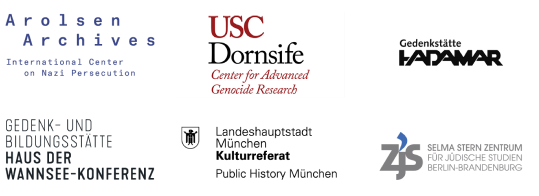Annotations
Moers
12/10/1941
Moers residents persecuted as Jews wait in front of the "Steinschen" restaurant to be transported on the Krefeld streetcar. Karl Coppel is standing by the right-hand window. 13-year-old Leo Mandelberger looks in the direction of the person taking the photo. The two were identified by survivor Werner Coppel.
Annotations
People
3
Keywords
1
Historical context
Deportation von Moers nach Riga am 10.12.1941
On the morning of December 10, 1941, more than 80 members of the Moers synagogue community had to present themselves at the "Steinschen" streetcar stop. From there, they were taken to Krefeld on a streetcar operated by the Krefeld Verkehrs AG. Together with Krefeld deportees, the Jewish residents of Moers continued their journey by train to Düsseldorf main station. From Düsseldorf main train station, the deportees had to walk to the Derendorf slaughterhouse before everyone’s eyes- a 45-minute walk. They had to spend the night there. The next morning, the train departed at 10:30 a.m. with 1,007 deportees on board. The cars were overcrowded, and there was neither food nor drink. On December 13 at 11:35 p.m., the deportees arrived at Skirotava station, Riga. Not until the next morning were the unheated cars opened and the people taken to the Riga ghetto. Only two deportees from Moers survived the Shoah. Of the others, some were murdered in Riga and the surrounding woods, while the rest either succumbed to the fatal living conditions in the ghetto or were transferred to labor and concentration camps and killed there after the ghetto was dissolved in March 1943.
About the image series
Three reproductions of the black-and-white original photographs in 17 x 12 cm format have survived. The fourth photograph has only been preserved as a digital copy and a book print copy respectively. The pictures depict the transport of the deportees from Moers: One picture shows people waiting in front of the “Steinschen” restaurant in Hülsdonker Straße in Moers, two others show people boarding the streetcars provided by the Krefeld Verkehrs AG. The photographer took the pictures from only a short distance away to have a good view of what was happening. The quality of the pictures is low, the photos are blurred. This might hint to the photographer’s having either little experience or no opportunity to take an open and focused picture.
Photographer
Unknown,
Provenance
Stadtarchiv Moers (the Moers municipal archives) made reproductions of the three deportation photographs at an unknown date. Johanna Meyer was recorded as the owner of the originals. Johanna Meyer came from a Jewish family and was married to Karl Meyer, a non-Jew. She survived in hiding in Moers and continued to live in the town until her death in 1981. The whereabouts of the negatives and the historical prints are unclear. This is also true for the other photograph that was printed separately in the publication “Moers unter dem Hakenkreuz” (Moers under the Swastika) (2008). It is not part of the estate of the publication’s author Bernhard Schmidt who passed away in 2023, and its origin is unclear. Stadtarchiv Moers handed prints of the first of the two photographs showing the deportees boarding the streetcar to the archive of the Yad Vashem World Holocaust Remembrance Center in Jerusalem in 2003.
Call number at source archive
StA Moers, Bestand 60, Nr. 470
Title at source archive
Warten auf den Transport an der Haltestelle „Steinschen“ der Krefelder Straßenbahn (Krefelder Straße)
Acknowledgements
Many thanks to Alena Saam from Stadtarchiv Moers for her dedicated support in describing and cataloging the images and to Klaus Zok for the valuable information he provided.
Text and research by Lisa Paduch und Marcel Layher.
Kooperationsverbund #LastSeen. Bilder der NS-Deportationen Dr. Alina Bothe Projektleiterin
c/o Selma Stern Zentrum für Jüdische Studien Berlin-Brandenburg
Freie Universität Berlin
Habelschwerdter Allee 34A
14195 Berlin
lastseen@zedat.fu-berlin.de
Ein Kooperationsprojekt von

Gefördert durch

Datenschutz | Impressum